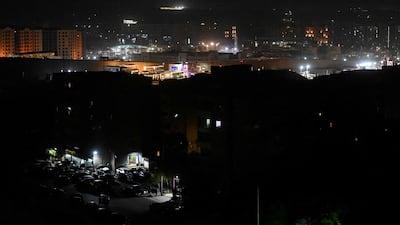Egypt's Prime Minister Mostafa Madbouly has apologised for widespread power cuts that have hit the country as it deals with an intense heatwave.
“I renew the government's apology. We are fully aware of the extent of Egyptian families' suffering from the problem of electricity outages,” Mr Madbouly said in a televised address on Tuesday.
The Prime Minister also announced a series of measures aimed at easing the crisis, including the earlier closure of shops at 10pm each evening.
He said $1.18 billion would be allocated to tackle the power shortages during summer.
The funds will be used to import more natural gas and mazut, which are in short supply amid increased power consumption, Mr Madbouly said.
The ministries of petroleum and mineral resources, and electricity issued a joint statement apologising for the electricity crisis on Monday.
Despite co-ordination between the two ministries, the unusually high temperatures meant power cuts had to be extended by an hour, to three hours daily, until the end of the week to “maintain safe and stable operation of the gas network and power generation plants”, they said.
Mr Madbouly said President Abdel Fattah El Sisi had directed the government to deal with the situation and resolve it.
The Prime Minister assured the public that power cuts would end by the third week of July.
Backlash
Egyptians took to social media to criticise the government's apologies, where hashtags related to the electricity crisis and the heatwave have been the most talked-about subjects in the country this month.
Prominent figures accused the government of failing to do its job and called for those responsible to be held accountable.
“Why are you failures? (Turn off the lights),” said Nasser Amin, a prominent lawyer, in a post on X on Tuesday.
“This country went through a war for six years (67-73), a third of the Egyptian state's land was occupied, the enemy was 90km from Cairo, the enemy's aircraft were striking deep from Helwan to Aswan, and the government was asking people to turn off the lights during the attack, not cutting it off from them,” Mr Amin said, referring to the 1967 war and subsequent Israeli occupation of the Sinai peninsula.
Shops closed
Part of the government’s plan to deal with the crisis will be to shut down shops and malls from 10pm. Pharmacies and supermarkets are exempt from this directive, Mr Madbouly said.
The decision was criticised by Egyptians who said people typically stay out late during summer, with businesses staying open to cater to them.
The government attributed the crisis to unprecedented heatwaves in June, with temperatures exceeding 40°C, and even reaching 50°C in Aswan, putting enormous pressure on electricity consumption.
It also cited a technical malfunction in “gasfields in neighbouring countries” connected to Egypt's network, which caused a disruption in supply and forced energy authorities to increase power cuts to avoid a complete network collapse.
Egypt has been facing electricity shortages since last summer. At the time, Mr Madbouly said the government was prioritising exports to remedy a dollar crunch that has afflicted the economy since 2022.
Before the war, Israel was exporting about 800 million cubic feet of natural gas a day to Egypt.


